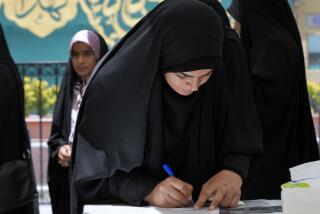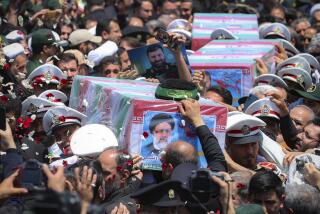After Obama-Rouhani phone call, both leaders face pressure at home
WASHINGTON — A day after his potentially momentous phone conversation with President Obama, Iranian President Hassan Rouhani was met at home Saturday by cheering supporters and some egg-pelting protesters, while a few members of the U.S. Congress offered a cautious, if somewhat muted, assessment of the first such contact between leaders of the two nations since 1979.
The reaction reflected the political realities in both countries over signs of a thawing of relations between the United States and Iran after decades of antagonism, most recently over Tehran’s nuclear program.
“I think you’re going to see very strong reactions in the U.S. and Iran,” said Jon Wolfsthal, deputy director of the James Martin Center for Nonproliferation Studies at the Monterey Institute of International Studies. “You’re trying to overcome 35 years of open hostility and a political narrative that’s going to be very difficult to overcome.”
Obama, who called Rouhani on Friday as the Iranian leader was driving to the airport, did not speak about Iran in his weekly Saturday address. Instead he focused on the healthcare law and his budget battle with Republicans in Congress. Those domestic disputes may have given him some cover on a sensitive foreign affairs issue that is sure to elicit intense debate.
Obama, speaking after his 15-minute conversation with Rouhani, expressed confidence that there could be a diplomatic solution to their nuclear standoff, though he spoke of “deep mistrust” between the nations and other obstacles. Rouhani also sounded a note of optimism, saying in a Twitter feed that “with political will, there is a way to rapidly solve the matter.”
The phone call and overtures by Rouhani have raised hope that Iran will accept significant restrictions to its nuclear program in exchange for the removal of sanctions that have choked its economy and stirred discontent among its citizens. Negotiations between Iran and the U.S. and other world powers are scheduled next month in Geneva.
U.S. Secretary of State John F. Kerry and national security advisor Susan Rice, in interviews to be aired Sunday, insisted that there must be verifiable evidence and enforceable agreements that Iran would seek nuclear power only for peaceful purposes before sanctions could be lifted and relations could be normalized.
“President Obama clearly welcomes President Rouhani’s overtures, but words are not going to replace actions,” Kerry said on CBS’ “60 Minutes.” “What we need are actions that prove that we and our allies, our friends in the region, can never be threatened by this program.”
Rice, speaking on CNN’s “Fareed Zakaria GPS,” said that it was “way too soon to presume ... the prospect of an agreement on the nuclear program, which we hope to be able to achieve, but we’re quite sober about the potential for that.”
In Israel, there was no official statement on the conversation between Obama and Rouhani. Israeli leaders, however, who were informed of Obama’s plans ahead of time, had been wary of Iran’s intentions since it began making diplomatic overtures.
Israeli Prime Minister Benjamin Netanyahu is scheduled to meet with Obama on Monday in Washington. Underscoring the delicate nature of the situation, Netanyahu instructed his ministers and spokesmen not to give interviews regarding the phone call, the Haaretz newspaper reported Saturday.
Obama and Rouhani are likely to face political constraints at home.
Rouhani got a taste of that when he returned to Tehran. While about 100 supporters of the first-year president gathered at the airport to greet him, a smaller group of hard-line conservative students pelted his car with shoes — a common sign of disrespect in the Muslim world — and eggs as he departed after a welcome-home ceremony.
“The aim of the negotiation is sheer propaganda by USA,” read a placard carried by one of the protesters.
Rouhani supporters, meanwhile, were exuberant about the discussion between the two leaders, saying it could lead to an easing of the longtime antagonism between the U.S. and Iran.
“Mr. Rouhani has been respectfully treated by U.S. top officials, so the years of humiliation have ended, and gradually freedom is coming back to Iranian society,” said Vida, a 50-year-old woman in a purple dress, who did not provide her last name.
Western analysts said the mixed reaction underscored the division within Iran’s elite on engagement with the U.S. Still, the small protest was relatively insignificant and “does not preclude Rouhani from continuing on his course that he wouldn’t have taken without the explicit endorsement of the supreme leader,” said Suzanne Maloney, a former State Department policy advisor, referring to Ayatollah Ali Khamenei.
Maloney, a Brookings Institution specialist on Iran, also viewed the phone call by Obama as an indication that the administration believed that Tehran was serious about finding a solution to break the long impasse.
“This is a very risk-averse president,” she said of Obama. “He wouldn’t have made the last-minute phone call if he thought the Iranians were all talk and no action.”
Yet Obama is likely to run into considerable opposition in Congress on any move toward rapprochement with Iran. Few members spoke of the call Saturday, preoccupied by the budget fight and the prospect of a federal government shutdown early this week.
Among those who did issue a public comment was Sen. Bob Casey (D-Pa). Though encouraged by the chat between the two presidents, he said, “I will insist that the U.S. keeps the pressure on Iran” as the parties look to the negotiations next month.
Times staff writer Lee reported from Washington and special correspondent Mostaghim from Tehran.
More to Read
Sign up for Essential California
The most important California stories and recommendations in your inbox every morning.
You may occasionally receive promotional content from the Los Angeles Times.











